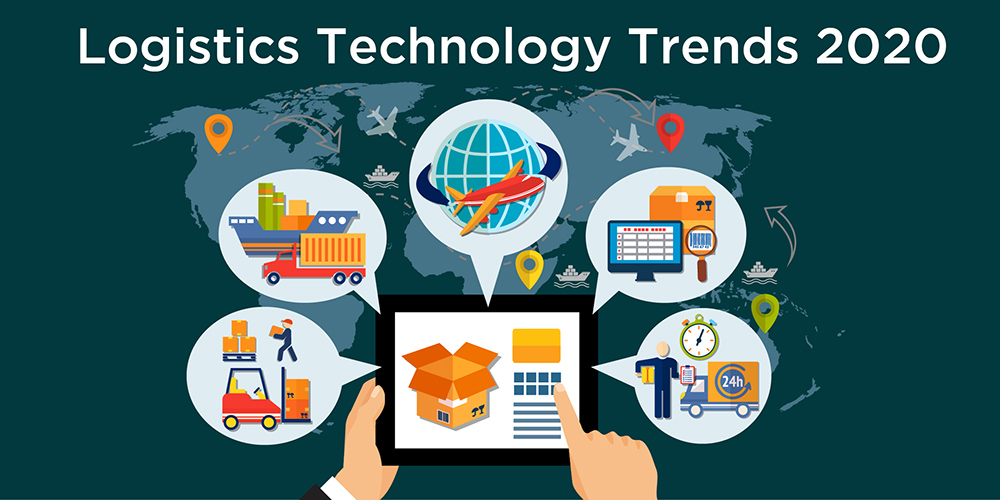

Digitization has proliferated in different industries and has proved to be a game changer for several business sectors worldwide. Until a few years ago, the logistics sector was in its nascent stage. But for the past couple of years, the market is experiencing disruption and the logistics firms that have established themselves are striking business deals with technology start-ups.
Technologies like IoT, cloud logistics, blockchain and big data are contributing to the faster, smarter and a more sustainable global supply chain. Today, we will be looking at the future of logistics and technology trends you should keep an eye on in the year 2020. But before we start talking about the trends of 2020, it’s important to know why digital transformation is necessary for the logistics industry.

Digital Transformation and Its Significance in the Logistics Industry
We live in the world where information is shared incessantly and is available on fingertips. This information and analysis of data, when made available to technicians and owners of transportation industry, makes it easier for them to optimize their processes and curb their costs.
Moreover, real-time information enables one to have a holistic view of the value chain with real-time information about traffic routes and flows, transport status and other data which affects costs incurred during accidents, weather turbulences and uncontrollable traffic conditions etc., enabling better optimization. It is also possible to analyze and process the information for demand and supply management so that the logistics owners can enhance the performance of their organization.
Technology Trends That Will Play a Key Role in The Year 2020
Cloud Logistics
The data has shifted to cloud and it is possible to get logistics IT services on-demand or through pay-per-use model. This makes it easy for smaller businesses as they do not have to invest must into creating IT infrastructure and pay for services only when they need it.
For example, Gateway Digital’s cloud-based logistics management systems take care of end-to-end logistics processes right from procurement to billing. Most of the supply chain information gets stored on cloud, providing a single overview. Also, as the data processing takes place through cloud, it is easy to access these services. Nearly 50% of logistics owners have adopted cloud logistics and other cloud based services. Another 20% are about to do so.
Big Data and Machine Learning
What makes data the most valuable commodity? A lot of reasons. The biggest being, it has the potential to revolutionize business models. In the logistics sector, analyzing and merging data by leveraging AI technology can offer better insights for risk management, demand forecasting and predictive logistics. When data streams containing traffic, weather and shipment information are merged, one can execute real-time route optimization.
Furthermore, big data can transform reactive logistics business models to a predictive one. A model like this, makes use of data received from online vendors to predict sales so that it becomes easier to ship extra orders. It also tracks the shopping habits of customers so that the deliveries can be made smoothly. Such models are used by Amazon to facilitate deliveries on the same day. Remember, nearly 98% third party logistics accept that big data is vital for the success of their organization.
Internet of Things (IoT)
When the internet of things is implemented through sensors and connectivity programs, it can connect any object to the internet, providing complete transparency and traceability right from the process of shipping to delivery. Sensors and beacons help in improving customer management and know about the problems that recur at specific route points.
IOT has also been bringing revolution in the logistics industry as one can automate the transportation process and trace the merchandise in the most secure way. Companies like DHL have connected warehouses, so they can tag equipment and individual items providing constant information about their position, operational status etc. making the warehouse processes efficient. IoT connected sensors can monitor humidity and temperature for cargo containing sensitive items like pharmaceuticals and food.
Consumers can avail facilities like IoT push buttons through which they can place an automated order and use smart locks by driving away the issues of unattended home deliveries.
Blockchain
Last but not the least, enters blockchain. It can decentralize data by enhancing traceability and transparency and provides users with all the information about a product’s journey. Users can verify if the product they have bought is authentic and is not adulterated or tampered with.
Brands like Walmart make use of blockchain-driven traceability bringing transparency across the entire supply chain. For a lot of logistics companies, Blockchain has simplified intricacies in the system and has led to a 15% increase in global chain along with 5% increase in global GDP.
Coping with Digitization Challenges through Gateway Digital
Companies that have not adopted digital transformation face a lot of challenges due to lack of connectivity. This includes family-run firms as well as global enterprises that have a long delivery chain making it impossible for them to track the delivery process.
If you wish to simplify your logistics processes and want to take a leap in your business through digital transformation, connect with Gateway Digital. Being a global end-to-end logistics innovation partner, we have worked with some of the biggest Freight Forwarders, Trucking Companies and NVOCCs. To know more, drop an email to us on info@gatewaydigital.eu.
© Copyright Digital Transformation in Logistics
Make a free website with Yola